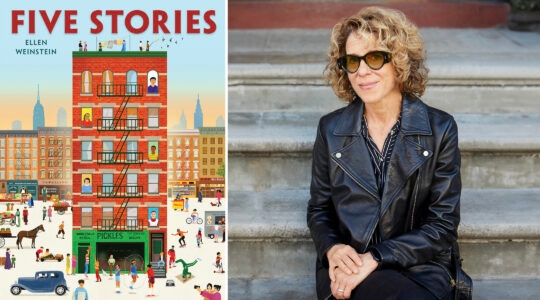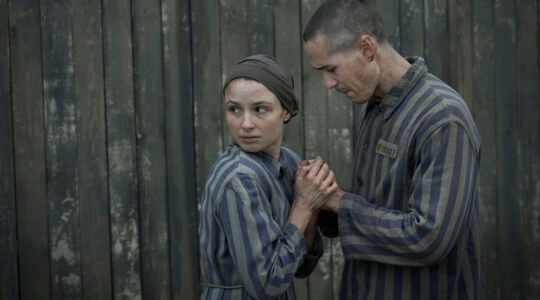
Matisyahu performing for the first time since shaving his trademark beard, at the Boulder Theater in Colorado, Dec. 15, 2011. (Dvora Meyers)
BOULDER, Colo. (JTA) — When Matisyahu, the 32-year-old Chasidic reggae superstar, appeared onstage for the first time since shaving his trademark beard, no one in the audience at the Boulder Theater seemed surprised.
The news of his shaving had been widely discussed since the star tweeted a photo of himself, along with a brief explanation for his cosmetic and philosophical changes. Though he was now missing the aesthetic hallmarks of Chasidic Jewry, he still wore a yarmulke — a large, black-knitted version — and his tzitzit hung out from under his plain white T-shirt. He also wore baggy khaki pants that sagged off of his slim, vegan-fed frame, a long black jacket and dark sunglasses.
Without the camouflage of his beard and peyes, his face was noticeably angular, gaunt even. His features looked delicate and feminine under the multicolor stage lighting.
The sold-out crowd didn’t seem to care, roaring with approval as he stood in front of the mike.
Yet some concert-goers expressed concern before the start of the show as to the viability of Matisyahu’s career without his signature look.
“I think it’s the beginning of the end of Matisyahu,” said Donny Basch, who was attending the Dec. 15 show with his wife. “If you’re going to see KISS and Gene Simmons comes out without makeup, I’d be really pissed.”
Others were more interested to see if any changes would result from his altered appearance.
“I’m curious to see how his concert today compares to the show in Philly,” said one woman, referring to a show she had attended several years prior that had a mix of Modern Orthodox and secular folks in the audience. “I thought it was a fun show, but mostly due to the mystique of a Chasid rapping and doing reggae.”
“I’m very interested in him and what his shift is philosophically,” Deborah Skovrom, a middle-aged woman, said of the singer’s new look and the deeper changes it might signify. “It’s a major shift in how he wants to be perceived.”
Yet she expected no changes in what perhaps matters most to fans — his music.
“His music and message is still right on,” Skovrom said.
Calvin Carter spoke even more emphatically in defense of Matisyahu’s choice to shave off his beard.
“He’s got the right to do that without people saying he gave up his faith,” Carter said. To him, the music is the point — “as long as the brother is spreading good cheer and good music.”
Carter was one of several stereotypical reggae fans in attendance — guys with long dreads and colorful knit Rasta hats. Most of the crowd, however, ranged in age from high schoolers to baby boomers and were white. Many seemed to have stepped off the pages of a J. Crew catalog.
Newly shorn and wearing his Gap-esque clothing, Matisyahu looked more like his fans than he ever has before. He danced jerkily across the stage. Many in the audience followed suit, yet few reached down to pick up their fallen yarmulkes as the singer did several times throughout the night.
Addressing the audience briefly after a few songs, Matisyahu spoke in unaccented American English without any hint of the patois he adopts when he busts into reggae and dancehall, and none of the “oys” and Ashkenazi pronunciations he sprinkles throughout his songs — especially those that are extra heavy on Jewish and messianic themes. In those brief moments he was simply Matt Miller.
And some people seem to like it that way.
“I think it’s kind of sexy,” said one Jewish woman of Matisyahu’s new look. “With the beard he looks like every other Chasidic Jew.”
It’s an interesting observation — to Jews, looking like a Chasid makes you look like every other Orthodox Jew. It makes you seem like you’re part of a black-and-white-clad monolith. But on the stage of popular music, the beard — not the neatly shorn scruff favored by Brooklynites but a long, full beard — makes one stand out. Some may even argue that it helped launched Matisyahu’s career.
He covered many of his most popular songs — “Jerusalem” and the seasonally appropriate “Miracle” — yet the evening’s highlight was the final song (before the encore set), “One Day.” The song had been used as the official anthem of the 2010 Winter Olympics due to its utopian message.
During his performance, Matisyahu was joined on stage by more than two dozen teens from the audience. A couple of the girls embraced him, clearly unaware of — or undeterred by — Orthodox Judaism’s prohibition against touching between the sexes. Though he did not brush them off, he seemed to momentarily stiffen. His beard may be gone but his fidelity toward Jewish law remains.
“I’ve seen him several times and this is the best I’ve ever seen him,” said Jonathan Lev, the executive director of the Boulder JCC.
Whether his performance quality had anything to do with his new look is hard to say (especially since this reporter had never seen him live). In the blog post he had penned to accompany the photos, he said, “Sorry folks, all you get is me … no alias.”
For the fans who lined up outside the theater, crowded around the stage and sang along with him, that seemed to be more than enough.





